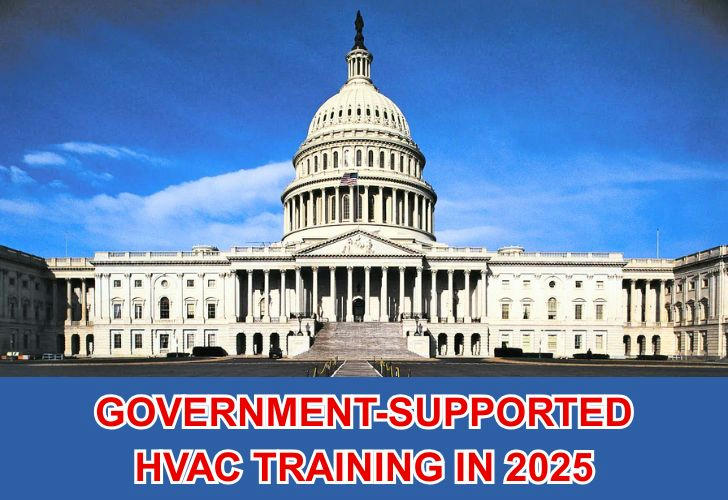Unlock Your Future with 2025 Government-Supported HVAC Training
The HVAC industry is booming, with demand for skilled technicians projected to grow by 15% over the next five years—a rate faster than the national average for most occupations. In Wyoming alone, employers like Redi Services, LLC are offering salaries of $32–$35 per hour for certified HVAC professionals, alongside benefits like health insurance, 401(k) plans, and career development programs.
But breaking into this high-demand field requires more than just enthusiasm; it demands credible training and certifications. That’s where the 2025 U.S. Government-Supported Paid HVAC Training Program steps in—a game-changer for aspiring technicians and career changers alike.

❓Why Government-Backed HVAC Training Matters Now
The Bureau of Labor Statistics projects a 5% growth in HVAC jobs through 2031, with over 19,000 openings annually. To address this gap, the federal government is investing in training programs that remove financial barriers and fast-track careers.
The 2025 program covers up to 85% of tuition costs for eligible candidates, combining classroom instruction with hands-on apprenticeships. Participants gain expertise in refrigeration principles, electrical systems, and advanced technologies like building automation—skills directly aligned with employer needs. For example, companies like Redi Services, LLC in Rock Springs, Wyoming, prioritize candidates with certifications in EPA refrigeration, brazing techniques, and NATE credentials—all covered in the government-funded curriculum.
🏅Five Reasons to Choose Government-Supported HVAC Training
Zero Debt, High Income: Graduates enter the workforce with no debt, with starting wages averaging $32–$35/hour (as seen in Redi Services’ job listings). Over a 40-hour workweek, that translates to $66,560–$72,800 annually—well above the national median income.
Industry-Recognized Certifications: The program includes EPA Universal Certification and specialized training in variable refrigerant flow systems, making graduates competitive for roles requiring advanced technical skills.
Job Security: With HVAC technician roles labeled “essential” in all 50 states, this career offers stability even during economic downturns.
Career Advancement Pathways: Many employers, including Redi Services, offer ongoing training and benefits like 401(k) matching and healthcare after 60 days, ensuring long-term growth.
Community Impact: Technicians play a vital role in reducing energy waste and improving public health—a rewarding aspect for those driven by purpose.
🌟Who Qualifies for the 2025 Program?
This initiative targets both career changers and existing HVAC professionals seeking upskilling. Ideal candidates include:
- High School Graduates: No prior experience needed; the program starts with foundational coursework.
- Military Veterans: Transferable skills in mechanical systems and discipline align perfectly with HVAC demands.
- Current Technicians: Those with 1–2 years of experience (like Redi Services’ preferred candidates) can fast-track certifications to qualify for senior roles.
- Residents of High-Demand Areas: States like Wyoming, Texas, and Florida prioritize applicants due to extreme weather-driven HVAC needs.
Basic requirements include a valid driver’s license, clean background check, and passing drug screenings—standards mirrored by top employers in the field.
📈What Makes the 2025 Government Program Unique?
Unlike generic vocational courses, this program is tailored to address specific industry gaps. Participants gain hands-on experience in high-value skills such as HVAC piping techniques (brazing, flaring), interpreting blueprints, and troubleshooting complex systems—all competencies directly tied to job requirements in listings like the Rock Springs, WY position. The curriculum also integrates emerging trends, such as energy-efficient systems and smart HVAC technologies, preparing trainees for future-proof careers.
Financially, the program covers up to 90% of tuition for eligible applicants, with additional stipends for low-income households and veterans. This ensures that even those without savings or prior experience can transition into stable, high-paying roles.
💬Your Roadmap to Enrollment: Act Before Deadlines
Applying for the 2025 program requires strategic planning:
- Gather Documentation: Prepare proof of residency, high school diploma or GED, and any prior HVAC coursework.
- Complete the FAFSA: Federal aid applications determine eligibility for additional grants.
- Submit Your Application: Visit the Apprenticeship.gov portal
- Prepare for Interviews: Many programs partner with employers for immediate job placements post-graduation. Practice articulating your commitment to professional growth, a trait valued by hiring managers.
✅Real-World Outcomes: From Training to Paycheck
Graduates of similar government-backed programs report an average starting wage of $24–$28 per hour, with salaries climbing to $35+ within two years—mirroring the compensation offered in Rock Springs. Beyond pay, benefits like health insurance and retirement plans (highlighted in Redi Services’ package) become accessible, providing long-term stability.
Consider Maria Gonzalez, a single mother from Texas who completed a 2024 HVAC apprenticeship. Within six months, she earned her EPA certificat
📝Your Next Move: Seize the Moment
The 2025 HVAC training initiative isn’t just an educational opportunity—it’s a direct pipeline to middle-class stability in a recession-proof industry. With employers nationwide scrambling to fill roles, certified technicians enjoy unparalleled job security. For instance, Redi Services’ listing emphasizes “ongoing education” and career growth, signaling that even after hiring, employers invest in their teams’ advancement.
Don’t let uncertainty hold you back. The tools to transform your future are here, and the timeline is clear: Applications open in January, but preparation starts now. Research local training centers, connect with program advisors, and draft your application materials.
Ready to explore how this program aligns with your goals? Learn more about Registered Apprenticeships and their impact on HVAC careers through the U.S. Department of Labor’s official portal.
By investing in government-backed training, you’re not just learning a trade—you’re securing a future where your skills power homes, businesses, and communities. The question isn’t whether you can afford to enroll. It’s whether you can afford to miss out.
